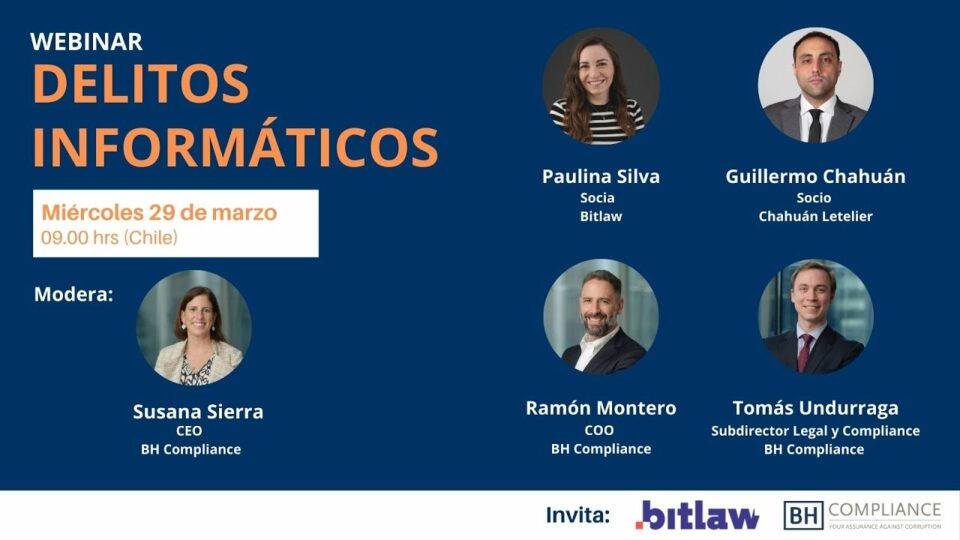
The new Economic Crimes Law has brought a series of challenges for companies, considering that, by expanding the catalog of crimes, they have had to adapt their Crime Prevention Models to comply with the new requirements.
In this context, Computer Crimes are part of the base crimes that point to the criminal liability of the legal person in this Law. Therefore, BH Compliance and Bitlaw held a webinar to provide guidelines and recommendations to address this crime, in addition to sharing good practices observed in recent times and that have been implemented by companies since the publication of the Computer Crimes Act, in 2022.
The event was moderated by Susana Sierra, CEO of BH Compliance, who stressed the importance of preventing this issue, as it applies to all companies without exception, being fundamental crime prevention models to address them, especially because it refers to an area that advances especially fast.
The panel was opened by Paulina Silva, partner of Bitlaw, who gave details of computer crimes in the field of criminal liability of legal persons, emphasizing that both the law on criminal liability of legal persons and the law on computer crimes “reflect a process of modernization of Chilean legislation in recent years to take charge of the instrumentalization of companies in the commission of crimes”. He also highlighted “the evolution in the sophistication of conducts against new elements such as computer systems and data”. He also specified the categorization of computer crimes, such as attacks on the integrity of a computer system, illegal access to it, or computer fraud, among others.
Then it was the turn of Guillermo Chahuán, partner of Chahuán Letelier, who gave more details about the crime of receiving computer data, since there is a greater risk for the criminal liability of legal persons.
Chaguán explained that this crime was not in the Budapest Convention, on which the Computer Crimes Law is based, but it was an innovation that arose during the Chilean legislative process, due to the doubt of what happened with the use of data coming from computer crimes, since it was not criminalized.
Ramón Montero, COO of BH Compliance, referred to the changes involved in the new Economic Crimes Law for companies and their Crime Prevention Models, considering that Computer Crimes are now part of the catalog of crimes of the regulation. In this sense, he pointed out that this law changes the scope of application and the penalties applicable to the legal person, in addition to new criteria of imputation.
He also emphasized that with the new law “there no longer has to be a benefit for the legal person, it is enough that it is carried out due to the lack of a crime prevention model. This is where the prevention model is strengthened, a correct implementation through a third party is a fundamental tool in crime prevention models”.
Finally, Tomás Undurraga, Deputy Legal and Compliance Director of BH Compliance, referred to the challenges faced by Compliance areas in the review and monitoring of their crime prevention programs. In this regard, he explained that the IT area is a new world, with its own language, a very specialized technical counterpart, a universe that is advancing by leaps and bounds and, therefore, it is very important to be updated. It is necessary to understand the language in order to talk to the specialized counterparts and detect the risks with them, and once we understand the language, to see what we currently have, where our information is, who has access to it, etc.”, he said.
In this regard, Undurraga stressed the importance of keeping the Crime Prevention Models up to date.










